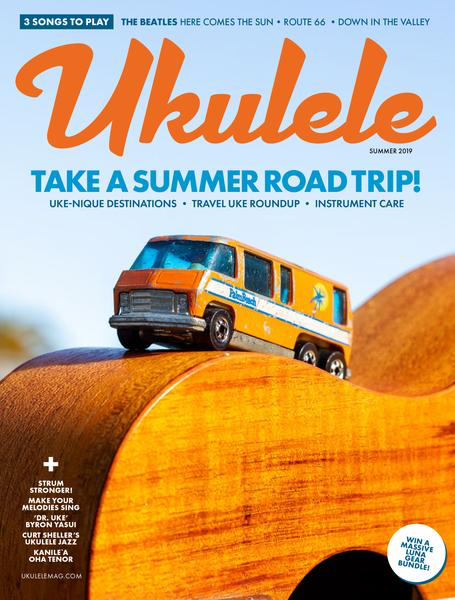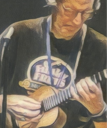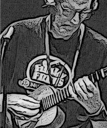Jazz
is improvisational music. Whether it's a simple re-phrasing of a standard melody or full blown improvisation. It's all about spontaneously creating music — spontaneous composition or at times spontaneously combustion. And, thrown in some harmonic movement, the chords and you have Jazz
, a true American art form. — Curt
Jazz Ukulele
Jazz, is the style where the repertoire/songs are drawn from and encompases a wide range of musical styles. Ukulele, is the instrument that you are performing this Jazz
on. It's actually that simple. Jazz Ukulele
And with that description behind us we can draw on a rich source of material from the jazz musicians perspective and specifically jazz guitarists as well as the not so-vast field of ukulele artists focusing on jazz.
Checkout what the National Museum of American History says about: What is Jazz?
:
Jazz is a kind of music in which improvisation is typically an important part. In most jazz performances, players play solos which they make up on the spot, which requires considerable skill. There is tremendous variety in jazz, but most jazz is very rhythmic, has a forward momentum called "swing," and uses "bent" or "blue" notes.

ukulelemag.com/stories/jazz-ukulele-curt-sheller
Jazz, based on previous impressions of what it is or a bad performance from what they perceived as Jazz. However, play them some excellent music without telling them it's Jazz and they'll most likely like it.
You can't do any better than to fall into that lineage.
Here's WikipediA's take on it.
Jazz — a music genre that originated at the beginning of the 20th century in African American communities in the Southern United States from a confluence of African and European music traditions. From its early development until the present, jazz has incorporated music from 19th and 20th century American popular music. It's West African pedigree is evident in its use of blue notes, improvisation, polyrhythms, syncopation, and the swung note. (from WidipediA)
 I got turned on and hooked on playing jazz guitar in my early 20's by Paul Byrne and have been playing and a serious student of all things jazz guitar and music ever since.
I got turned on and hooked on playing jazz guitar in my early 20's by Paul Byrne and have been playing and a serious student of all things jazz guitar and music ever since.
Like a lot of guitar players my age, it all started around 1963-64. It was rock 'n' roll and the British Invasion that got me into wanting to play guitar. Discovering Jazz in my 20's opened up the possibilities of the guitar. Re-discovering the ukulele in 2003, I naturally started exploring developing my jazz repertoire on the ukulele.
There's a lot of mystic surrounding learning playing Jazz on guitar or ukulele. But it's not as hard as you might think. Is it musically more complicated than rock or country - definitely more is required, but well worth the effort, just think of it as an artist with a bigger box of crayons, more color possibilities.
In addition to studying jazz guitar for the past 40 plus years. I've been a private music teacher for the majority of those years with up 70 students a week at times of all ages, levels, styles, and instruments.
My background and training as a graphic artist and some computer and web programming chops. It allows me to present my material concisely, well researched, tested, and in an organized and professional manner. All that with making it easy and accessible to apply to ukulele.
Just like jazz guitar, jazz on ukulele is an advanced form of ukulele and is not usually your first introduction to the ukulele. After the fundamentals of the ukulele are covered, here is what would be typically involved in learning jazz ukulele.
Organization is essential when learning to play any music on the ukulele or any instrument. A real jazz guitar or jazz ukulele teacher would help. Here is my organization of the subjects and material that you would cover in a balanced jazz ukulele program of study. For all my students" lessons are customized to their particular experience and goals.
You’re born with a spark... to search for the truth, for the best you can be. Practice. Discipline. Preparation. Try and try again. Then one day you‘re on top and they say you're an overnight success, a “natural.” You smile, you know.— Anonymous
LESSON: Technique Lessons
I'm a firm believer that your never going to do anything musically that your fingers haven't done before. They can be trained to a very high level to do what they have been trained to do and hopefully at the right time.— Curt Sheller
LESSON: Theory Lessons
LESSON: Ear Training
LESSON: Repertoire Lessons
LESSON: Improvisation Lessons
LESSON: Songwriting Lessons
LESSON: Reading Music Lessons
LESSON: Music Idioms / Styles Lessons
LESSON: Arranging Lessons
All this leads to the development and nurturing of the artist within us all.
As you can see, it's quite a list. Don't despair! Like the proverbial journey of 1000 miles (1609.344 km), it can get done one step at a time. The biggest problem is organizing those steps. Of all ukulele and guitar-based forms, jazz is the most difficult to go it alone. That's one reason there are more Jazz majors in college now than at any other time in history.
My personal development and belief support the private teacher model. I was lucky enough in my jazz development to study jazz guitar and all things music with Chuck Anderson. I continue to use Chuck as a valuable resource regarding all aspects of my music career.
There is a great need for customized, dedicated personal teaching. The old European model of master and apprentice works well in this field. It, of course, needs some modern updating. But by and large, this model is more useful than the collegiate model. I would not recommend one try and go it alone when learning the more advanced topics that are part of the jazz repertoire .
Go the Lessons Section and get started...



 Personally for me – jazz is improvisational music. Whether it's a simple re-phrasing of a standard melody or full blown improvisation. It's all about spontaneously creating music - spontaneous composition or at times spontaneously combustion.
Personally for me – jazz is improvisational music. Whether it's a simple re-phrasing of a standard melody or full blown improvisation. It's all about spontaneously creating music - spontaneous composition or at times spontaneously combustion..jpg)